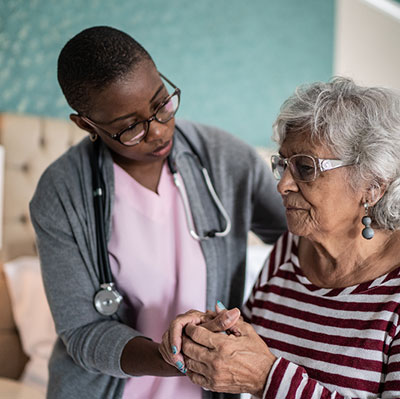What Is a Tremor a Sign of?

July 22, 2022
Clinical Contributors to this story:
Anton Svetlanov, D.O.
Philip A. Hanna, M.D., FAAN
It can be unnerving to experience a tremor—a rhythmic, involuntary shaking of the body part (limb, head or jaw, for example) that not only signals that something is wrong, but also represents a startling loss of control. Oftentimes tremors are not life-threatening, but in some cases, they can be a symptom of a more serious condition.
“Tremors of all kinds can be debilitating, and more than that, sometimes the frustration and embarrassment that comes with experiencing one can be as severe as the physical effects themselves,” says Philip A. Hanna, M.D., FAAN, the director of the Parkinson’s Disease and Movement Disorders Center at the Neuroscience Institute at JFK University Medical Center.
Age and hereditary risk are among the chief risk factors for essential tremor, while temporal conditions such as stress, fever, exhaustion and low blood sugar, or certain medications may either cause or exacerbate tremors. People often first experience essential tremor in middle age, and the symptoms can become more pronounced and debilitating with age.
“Tremors of all kinds can be debilitating, and more than that, sometimes the frustration and embarrassment that comes with experiencing one can be as severe as the physical effects themselves,” says Philip A. Hanna, M.D., FAAN, the director of the Parkinson’s Disease and Movement Disorders Center at the Neuroscience Institute at JFK University Medical Center.
Essential Tremor
The most common form is called essential tremor, which most frequently affects the hands but can also occur in the arms, legs, head or torso. Essential tremor also can affect a person’s vocal cords, leading to a shaky voice. Regarded as largely benign, these tremors can be so mild that they don’t require treatment, or in other cases, they can substantially impair a person’s ability to function.Age and hereditary risk are among the chief risk factors for essential tremor, while temporal conditions such as stress, fever, exhaustion and low blood sugar, or certain medications may either cause or exacerbate tremors. People often first experience essential tremor in middle age, and the symptoms can become more pronounced and debilitating with age.
When to See a Doctor
Even though most tremors are harmless, it’s important to see a doctor after experiencing one for the first time. A neurologist can help diagnose your condition and mitigate the effects of tremors through:- Medications such as the beta-blocker propranolol
- Physical therapy to increase muscle strength and coordination
- Surgery in severe cases—deep-brain stimulation (DBS) and focused ultrasound ablation
It’s also important to see a neurologist after experiencing a tremor because the tremor may point to a more serious neurological condition, such as Parkinson’s disease, multiple sclerosis or stroke.
The examination usually consists of both physical and neurological components, with doctors checking to see where in the body the tremors are occurring, as well as whether tremors occur when muscles are in use or at rest. Doctors will also look for indicators such as impaired speed or balance and may also collect blood and urine samples to test for thyroid malfunction.
“Tremors can be a nuisance—and they can also be a sign of a serious condition that needs to be addressed,” says neurologist and movement disorder specialist, Anton Svetlanov, D.O. “Even for people experiencing fairly mild tremors, it’s wise to see a doctor, both because we may be able to help manage symptoms and provide insight into whether there’s a more serious issue.”
Next Steps & Resources:
- Meet our sources: Philip A. Hanna, M.D., FAAN, Anton Svetlanov, D.O.
- To make an appointment with Drs. Hanna, Svetlanov or a neurologist near you, call 800-822-8905 or visit our website.
- Learn about treatment for movement disorders, including tremors
The material provided through HealthU is intended to be used as general information only and should not replace the advice of your physician. Always consult your physician for individual care.
Find a doctor near me
Learn more about our 9,500 providers. You can call, book online or schedule 24/7 video visits for Primary and Urgent Care.
Is Parkinson’s Disease Hereditary?

About 10 to 15 percent of all Parkinson’s disease is caused by genetics. But research points to a combination of genetic and environmental factors as likely causes.
The Numbers Behind Parkinson's Disease

Parkinson's disease is a neurodegenerative disorder that affects the production of dopamine in the brain.
Find a doctor near me

Healthy at Home with Parkinson's
It is essential that people living with Parkinson’s integrate exercise of their body, brain, voice, speech and swallowing muscles.

I Have Parkinson’s. Now What?
After receiving a diagnosis of Parkinson’s, many patients come to their physician with the same questions. Our expert shares his answers to the top six most frequently asked questions after diagnosis.

Pinched Nerve? When to See a Neurosurgeon
How do you know if you have a pinched nerve, and when should you see a doctor about it?

